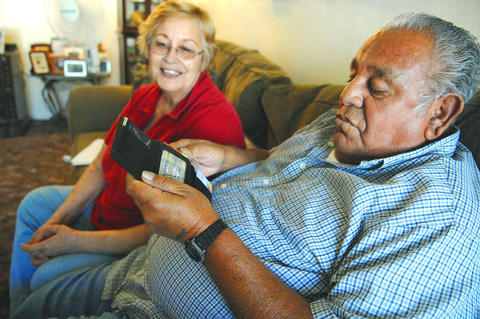A California man who lost his wallet more than 40 years ago finally got it back when workers fixing a movie theater discovered the billfold stuck in a radiator.
"I remember losing it," 70-year-old Epigmenio Sanchez said. "I just don't remember where."
The wallet still had family photos, old pay stubs and a couple of department store charge cards he had not seen in more than 40 years.

PHOTO: AP
His birth certificate also was there.
The only thing not in the wallet was money - but Sanchez said he cannot remember whether he had cash when the wallet went missing.
Sanchez said he used to go to the movies with his wife, Tillie.
"We wanted to get away from the kids for a while," Tillie Sanchez said. "That was our little escape."
Epigmenio Sanchez said he never expected to see the wallet again. "It brings back good memories."
加州一名男子皮夾弄丟四十多年後竟失而復得。幾名整修戲院的工人發現了這個卡在電熱器中的皮夾。
七十歲的艾皮戈曼尼歐:桑雀茲說:「我記得它不見了,不過我記不得是在哪裡弄丟的。」
這個遺失了四十多年的皮夾裡還放著家人照片、以往的薪資單及幾張百貨公司簽帳卡。
他的出生證明也在皮夾裡。
皮夾內唯獨沒有現金,但桑雀茲表示,他記不得皮夾遺失時裡面是否放了錢。
桑雀茲表示,他過去時常和老婆泰莉去看電影。
泰莉:桑雀茲說:「我們想暫時擺脫孩子,那是我們可以稍微喘口氣的方法。」
艾皮戈曼尼歐:桑雀茲表示,他從沒想過皮夾會失而復得。他說:「這讓我想起了過去的美好回憶。」(美聯社/翻譯:林倩如)

US President Donald Trump has renewed his ambition to take control of Greenland for national security reasons and questioned whether Denmark has any legal right to the Arctic island. The debate has revived scrutiny of how Greenland became part of Denmark, its current self-rule and path to independence, and Washington’s military footprint. HOW DID DENMARK GET GREENLAND? Greenland was inhabited by Inuit peoples from Asia and North America intermittently from around 2,500 BC. Around 985 AD, Vikings led by Erik the Red settled in southern Greenland, farming and building churches. Around the same time, ancestors of today’s Inuit arrived, living as hunters

Owls have long fascinated people with their distinctive appearance and mysterious habits. These nocturnal birds possess large, round eyes and a flat facial disc. Their feathers come in shades of brown, gray, or white, helping them blend easily into the darkness. The most remarkable trait of owls is that they can turn their heads without damaging blood vessels. Contrary to popular belief, they can only rotate their heads up to 270 degrees, not 360 degrees. Owls have 14 cervical vertebrae, which is twice as many as humans. This special physical structure compensates for their inability to move their eyes within their

AI-generated summaries are shaking up the media world. Tools like Google’s AI Overviews now provide users with direct answers above the search results, resulting in fewer people clicking on news links. For publishers who rely on that traffic to generate advertising revenue, this shift is hitting hard. The fallout is measurable. Many sites have seen a sharp drop in traffic since AI summary features rolled out. An analysis revealed that a news outlet that had once ranked first on Google lost up to 79% of its traffic when its link appeared beneath an AI-generated summary. Statistics also show that

A: Bloomberg just released its annual travel guide, titled “25 Best Places to Travel in 2026.” What were the best Asian destinations? B: There were actually six Asian hotspots: Taiwan’s Taipei, Malaysia’s Penang, Kazakhstan’s Almaty, Indonesia’s Rote Island, India’s Tiger Reserves, and Oman. A: With its mix of traditional food and modern cuisine, Taipei has become a rising food capital in Asia. B: As Bloomberg reported, “Taiwan is a place that bubbles up in culinary conversation because of its famed beverage, bubble tea, and its early adoption of modern night markets.” A: And Din Tai Fung has now